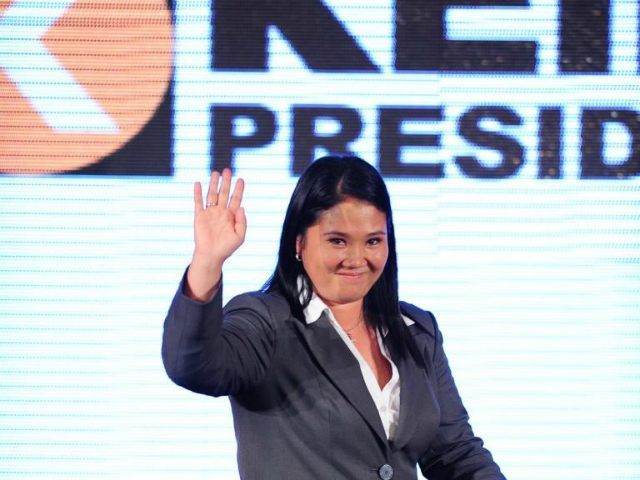Conservative candidate Keiko Fujimori is leading Peru’s presidential election with 32 percent of the vote, according to the latest national polls, signaling a potential shift rightward for yet another South American nation.
The poll, conducted by political firm CPI, finds Fujimori leading second-place candidate César Acuña by more than double the number of voters. Acuña, running for the Alliance for Progress party and making his best showing yet, received 15.2 percent of the vote, with Oxford-educated economist Pedro Pablo Kuczynski in third place with 13.1 percent of the vote. Rounding out the top tier is Alan García, who served two non-consecutive terms as president of Peru, with 7.2 percent of the vote. Another former president, Alejandro Toledo, is also in the running but has not been able to increase his support into double digits.
Fujimori’s lead is particularly notable because Peru’s presidential system requires a second runoff election should no candidate receive more than 50 percent of the vote in the first election. Peruvians are scheduled to go to the polls on April 10.
Peruvian newspaper La República notes that, with Fujimori so far in the lead, the real battle is between Acuña and Kuczynski. A Datum poll also released this week finds Kuczynski, or “PPK” as he is colloquially known, ahead of Acuña.
The polls appear not to have changed much since December, when Fujimori polled at 33 percent and Kuczynski solidly held second place. One notable change is the spike in Alan García’s unfavorability ratings. A survey by local firm Pulso Perú found that 41 percent of voters would not even consider voting for Garcia. In contrast, only 6 percent said they would not consider voting for Fujimori.
Garcia and Fujimori boast the greatest name recognition of the candidates due to their past proximity to the nation’s executive position. Garcia ran Peru from 1985-1990 and then again from 2006-2011, first as a bold anti-International Monetary Fund reformer and later as an establishment moderate.
”We are faced with a dramatic choice: It is either debt or democracy,” Garcia told the IMF in 1985, before sending the nation’s economy into hyperinflation. While his first term was not enough to prevent him from being re-elected following the demise of conservative president Alberto Fujimori, questions surrounding the mysterious pardoning of hundreds of drug traffickers during his second term is giving many Peruvians reservations about privileging Garcia with a third term.
Fujimori, meanwhile, became a household name under her father’s presidency, later serving as his First Lady following his divorce from Susana Higuchi, who later ran against the elder Fujimori for president and accused him of ordering intelligence services to torture her. Keiko Fujimori served as First Lady in the backdrop of this dramatic narrative, while her father worked to destroy and ultimately eradicated the Shining Path Marxist terrorist organization. Under the direction of Marxist professor Abimael Guzmán, the group killed as many as 70,000 civilians.
Upon his capture, Fujimori displayed Guzmán in a cage, wearing a theatrical jailbird uniform:
Keiko Fujimori would go on to have an extensive career in Peru’s legislature, and now, as a presidential frontrunner, is facing significant attacks related to her father’s tenure. This week, Fujimori dismissed remarks by a formerly imprisoned drug trafficker claiming his illicit business was protected under the Fujimori presidency.
The man—Demetrio Chávez Peñaherrera, known as “Vaticano”—claimed the elder Fujimori “knew plainly my drug trafficking activities” and that, under Fujimori, “Peru was a narco-state.”
“For me, this has no credibility,” Keiko Fujimori remarked. “This person was extradited and condemned during my father’s tenure, and it was under the next government [of President Alan García] that his sentence was reduced.”
The first Peruvian presidential debates will take place on February 11 and 12.
Should Fujimori secure the presidency, hers will be the latest in a string of notable right-wing victories in Latin America. In November, Argentine President Mauricio Macri secured a victory over the handpicked successor of leftist Cristina Fernández de Kirchner, promising to pressure the leftist Venezuelan government on human rights violations and liberalize socialist Argentine economic policies. In December, socialists in Venezuela soundly lost control of the National Assembly for the first time in 17 years.

COMMENTS
Please let us know if you're having issues with commenting.